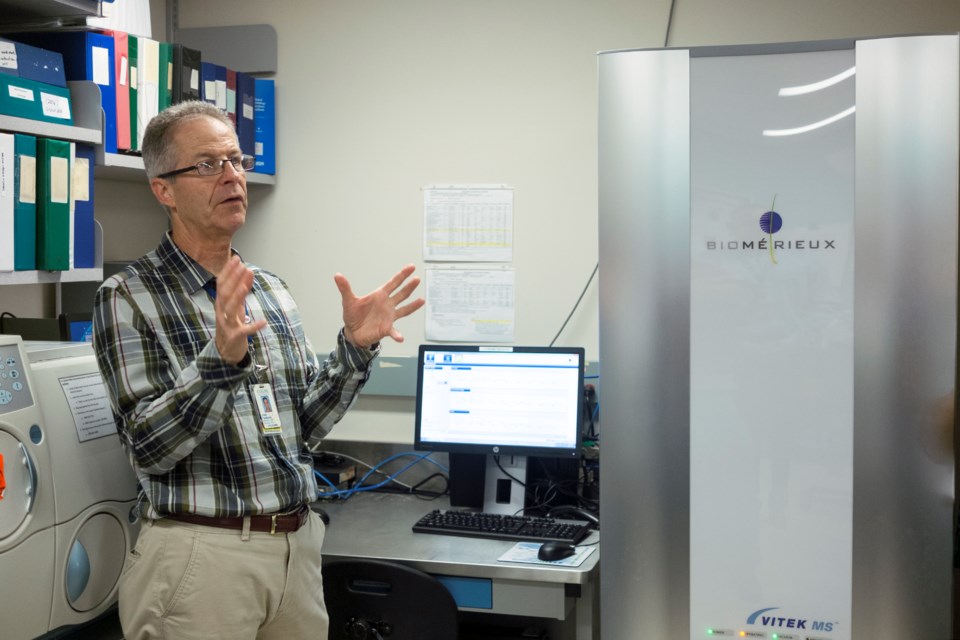The hospital’s newest piece of diagnostic equipment is about the size and shape of a refrigerator, costs almost $250,000 and, if it does what it promises, will save lives.
Guelph General Hospital’s new MALDI-TOF mass spectrometer began service on Wednesday, promising to dramatically reduce the time it takes for the institution’s Microbiology Lab to identify infecting organisms.
Previously, if a patient at the hospital was suspected of having an infection, a bacterial sample would be taken to the lab, grown over as many as three days and then viewed under a microscope for identification.
The MALDI-TOF (Matrix-assisted laser desorption ionization – time of flight) uses a laser to blast a sample into millions of pieces and then compares the remainig proteins against a database to make an identification of the infecting organism in the span of just 50 minutes.
Dr. Jennifer Caspers, GGH’s chief of staff, said the device will allow the hospital to more accurately gather information about a patient’s status and then treat them more effectively.
By identifying infecting organisms quickly and more accurately, Caspers said the device will cut down on antibiotic overuse.
“You’re putting the patient at risk by possibly putting them on a drug regimen that is not appropriate. What this does is narrow that window down from three days to 50 minutes and we are able to say we know what the appropriate antibiotic is and that is going to hopefully get the patient better faster,” said Caspers.
Not only does the device more quickly and accurately identify infecting organisms, the cost per analysis is less costly than current methods, not counting the initial cost of the machine.
That almost $250,000 initial cost for the device was covered entirely by donations from the Foundation of Guelph General Hospital’s Circle of Life program, a collective philanthropy program consisting of members who commit at least $1,500 annually and then vote to fund one high-priority project each year.
Suzanne Bone, CEO of Foundation of Guelph General Hospital, said she believes Circle of Life members voted for the MALDI-TOF because of how innovative the device is and the immediate impact it will have on the quality of patient care.
“Patients will be able to go home sooner and (the hospital) would be able to care for additional patients,” said Bone.
John Tarbush, laboratory supervisor at GGH, said in the past the Microbiology Lab has had to send some problem samples away for analysis — a process that can take up to a week.
“Any time you can give the clinician the organism identification early, you’re going to save lives, you’re going to save money and there’s going to be less morbidity with the patient,” said Tarbush.
The MALDI-TOF is going to eliminate a number of slower, less reliable and more expensive forms of testing, he said.
“People tell me when they got it they blew their lab up. They blew it all up and rebuilt it around the MALDI-TOF,” said Tarbush.
“What we’re going to shake off is all kinds of quirky tests — they’re gone,” he added.
Caspers noted an incident last year in which GGH needed to borrow the use of a similar machine at the Ontario Veterinary Hospital at the University of Guelph.
“C. difficile is a nasty bowel infection. On one of the floors we had three patients with C. diff. Then you start thinking, ‘my goodness, have we caused that? Did it go from patient A to patient B to patient C from our lack of hand washing or something we had done?,” said Caspers.
Previously, said Caspers, the hospital would have assumed the patients were infected from cross-contamination, forcing a costly declaration of an outbreak — closing the unit for cleaning and restricting visitors.
Instead, the samples were taken to the Ontario Veterinary Hospital and analysed.
“We found they were all discreet samples, they weren’t related, so we had not caused that outbreak on the floor — they were seperate issues,” said Caspers.
Cost savings associated with not having to close down the unit factored into the decision making process to have the MALDI-TOF pitched as an option for funding by Circle of Life, she said.
